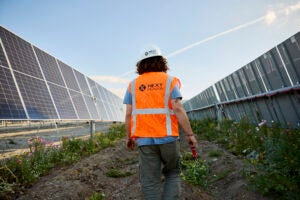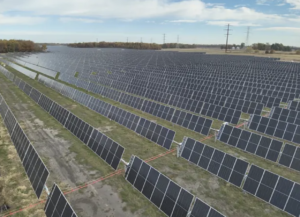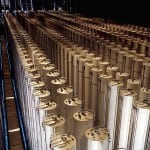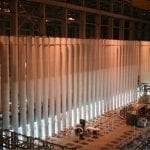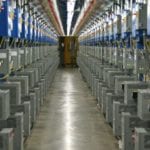The U.S. Energy Department last week offered French firm AREVA a conditional $2 billion loan guarantee to facilitate financing of a uranium enrichment facility planned for development near Idaho Falls, Idaho.
The $3.3 billion enrichment facility, dubbed “Eagle Rock,” must satisfy certain conditions before the loan guarantee can be issued, including the receipt of all appropriate licenses and permits. AREVA submitted a license application to the Nuclear Regulatory Commission (NRC) in December 2008 to build the Eagle Rock plant at a site 18 miles west of Idaho Falls. If approved, construction on the 3.3 million separative work unit (SWU) facility could begin in 2011 and operations as early as 2014.
The Eagle Rock plant will use centrifugation, the same industrial process as the Georges Besse II plant, and which has “significant efficiency advantages over previous generation technologies,” AREVA said in a statement. The Georges Besse II plant is being built on the Tricastin nuclear site in Southern France. It comprises two enrichment units and will produce 7.5 million SWUs when it reaches full capacity in 2016.
According to AREVA, the centrifuge enrichment process is a major technological accomplishment as it uses 50 times less electricity than gaseous diffusion used until now in France.
The light-water reactors that comprise the U.S. fleet are fueled by low-enriched uranium, in which the concentration of the easily-split U-235 isotope is raised from less than 1% found in natural uranium to between 3% and 5% percent by weight (natural uranium is largely comprised of the U-238 isotope.)
Currently, the U.S. obtains half of its enriched uranium from Russia under the Megatons-to-Megawatts program, in which weapons-grade nuclear materials from the Cold War era are converted to civilian nuclear fuel. But, “The program expires in 2013, after which alternate sources of enrichment services will be required to support the continued and expanded use of nuclear power in the United States,” the DOE said in a statement.
Eagle Rock is the ninth project to be offered a conditional commitment by the DOE since March 2009. Maryland-based USEC had also applied for a loan guarantee for its American Centrifuge Plant, which is currently being built in Piketon, Ohio. The DOE last year delayed final review of that company’s application, however, citing technical and financial concerns.
In a statement earlier this month, USEC said it had “significantly demobilized and reduced construction and machine manufacturing activities in the American Centrifuge project in order to preserve liquidity,” while it addressed those concerns. Meanwhile, it said, it was continuing American Centrifuge demonstration activities, including “evaluating how best to configure the project on a go-forward basis, and evaluating our strategic options for the future of the project.” USEC also said it would update its application with the DOE this summer.
In related news, on Monday, USEC announced that Toshiba Corp. and Babcock & Wilcox Investment Co.(B&W), had signed a definitive agreement to invest in USEC over three phases, each of which is subject to satisfaction of specific preconditions, including regulatory approvals.
The $200 million investment, shared equally between Toshiba and B&W, is expected to strengthen USEC’s financial position for the deployment of the American Centrifuge.
“We have decided to make this investment in American know-how and American technology in order to produce more uranium fuel for the growing worldwide nuclear power market with high confidence in USEC as a leading supplier of low enriched uranium,” said Yasuharu Igarashi, corporate senior vice president of Toshiba. “The nuclear renaissance is moving forward and this investment will help power its growth by securing the supply of uranium fuel for existing and potential customers.”
All three companies have agreed to work together on additional strategic business opportunities. Under the arrangement, USEC could provide enriched uranium for bundling with Toshiba’s nuclear power plant proposals, including the proposed South Texas Project.. USEC and B&W also plan to complete the joint venture announced last year to manufacture USEC’s commercial AC100 centrifuge machines for the American Centrifuge Plant.
USEC intends to use the funds for general corporate purposes and for investment in the American Centrifuge Plant. USEC is operating a cascade of centrifuge machines in a commercial plant configuration, collecting data and experience in preparation for transitioning into full commercial operations.
Sources: AREVA, USEC, POWERnews, DOE


